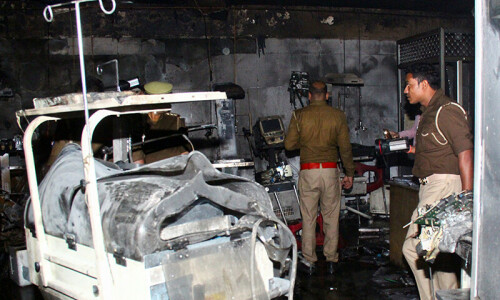ISLAMABAD: The Supreme Court on Tuesday acquitted Shahrukh Jatoi, who was convicted for the December 2012 tragic murder of 20-year-old Shahzeb Khan in Karachi.
Headed by Justice Ijazul Ahsan, a three-judge SC bench also ordered acquittal of the co-accused in the case, including Nawab Siraj Talpur and Sajjad Talpur.
The court had taken up an appeal moved through senior counsel Sardar Latif Khosa against the May 13, 2019, Sindh High Court (SHC) judgement wherein the accused had been acquitted of the charges of Section 302 of the Pakistan Penal Code, but his conviction under Section 7 of the Anti-Terrorism Act (ATA) had been reduced from a death sentence to imprisonment for life.
Shahzeb Khan, a son of a police officer, was returning from a wedding on the night of Dec 24, 2012, when he was gunned down for saving his sister from harassment by the accused in Karachi’s Defence Housing Authority in Darakhshan police precincts.
AGP office to move review petition against verdict pronounced without its input
On Tuesday, Sardar Latif Khosa argued before the Supreme Court that during the pendency of appeals before the relevant fora, Shahzeb’s family entered into a compromise with all the accused whereby the victim’s family also filed compromise pleadings, but the compromise could not be acted upon as the accused were convicted and sentenced under the ATA.
The petitioner argued that Shahzeb’s “unfortunate murder” was a result of “triviality and a sudden brawl” in the dead of the night without the slightest element of creation of terror, as none was around the place of occurrence. The legal heirs compromised and the state was bound to facilitate the arrangement in terms of earlier judgements and the petitioner was entitled to acquittal, he argued.
Soon after the order, the attorney general’s office announced that it would move a review petition against the court decision since it was pronounced without seeking the stance of Attorney General for Pakistan (AGP) Ashtar Ausaf.
In a statement, the AGP office said it was “despite the instant case having already been adjudicated to be one of constitutional importance by the Supreme Court”, which mandated seeking assistance of the AGP, as had been sought previously in petitions pertaining to the same matter.
In the case of Muhammad Jibran Nasir, the AGP had already contended that the accused had committed an act of egregious terrorism and that the SHC’s acquittal order of Nov 28, 2017 was per incuriam (lack of due regard to the law or the fact) in view of the SC’s own order that the accused be tried under anti-terrorism provisions.
The AGP’s position was duly accepted in the SC judgement and subsequently, convictions of the accused were upheld in appeal by the SHC and duly handed down after close consideration of the evidence during the trial by an anti-terrorism court judge in Karachi.
“Be that as it may, in the event that the apex court has arrived at an outcome outside of its own previous pronouncements relating to anti-terrorism offences, the AGP’s assistance must regardless be sought as to the acceptance of compromise, the scope of fisad-fil-arz, and the particular circumstances of the instant case – in which a review of judgement would be eminent.”
For all these reasons, the AGP office would be filing a review petition against the apex court judgement pending issuance of the detailed reasons, in the interest of justice.
On Nov 28, 2017, the SHC had remanded back the case to the relevant sessions court for denovo trial, including consideration of the compromise application filed by the accused and the legal heirs of the victim.
The last time the case came up for hearing before the Supreme Court was in Jan 1, 2013 when former chief justice of Pakistan Iftikhar Muhammad Chaudhry, as a result of public outrage, took suo motu notice as the police had failed to make any progress in the case owing to immense political pressure. The murder mobilized hundreds of people who gathered outside the Karachi Press Club carrying banners requesting the chief justice to take action.
After committing the murder, the main accused, Shahrukh Jatoi, had managed to flee the country, but was brought back on court orders. A few weeks later, the SHC granted the accused bail, and some civil society members petitioned the SC, challenging the release of the convicts. On Feb 1 that year, the Supreme Court had set aside the bail and ordered Jatoi’s arrest from courtroom No 1 with a direction that the trial of the case be conducted in terms of ATA by an anti-terrorism court.
A review petition was also moved through Jatoi’s counsel Latif Khosa, arguing that the case stood eclipsed and was destined to be prejudiced if expunction of remarks, reviewing the directions and modification of the findings by revisiting the judgement was not carried out for safe administration of justice.
The petition contended that Article 184(3) of the Constitution did not cater to cases emanating in the judicial hierarchy, which was regulated by due process of law sanctified as a fundamental right under the Constitution.
Published in Dawn, October 19th, 2022








































